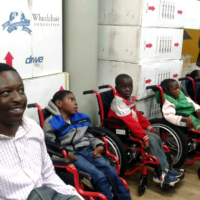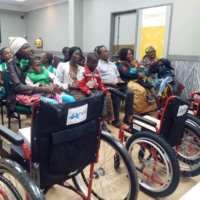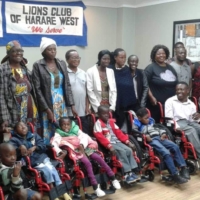Ghana celebrates International Day of People with Disability
December 3rd, 2011 – GHANA, WESTERN AFRICA
It was a long journey, but earlier this week I found myself in the city of Wa, Ghana, in western Africa. We traveled to Wa with our country partners, Ministerial Development and Relief Programme, to participate in Ghana’s celebration of the International Day of People with Disability.
We marched in a parade through the city with an array of people representing all sorts of disability, visual, physical, hearing impaired, etc. It was amazing, and certainly worth the effort to get there. There was only a single wheelchair in the parade, but it was one that had been donated years before by Wheelchair Foundation.
Rehabilitation Center in Ghana
December 7th, 2011 – KUMASI, GHANA
Wednesday we found ourselves in Kumasi, Ghana, where we visited a rehabilitation center for abandoned children and adults with disabilities. The center’s director talked with us about the challenges of social stigma in Ghana, and of how families would deliver children to the center and never return.
The center is totally supported through donations, and the 15 wheelchairs we presented to them will make a significant impact on those without mobility. Thanks again to Keegan Resources Inc., and African Gold Group for making this donation possible.
Salem Noshie and son, William Wonder
December 8th, 2011 – ACCRA, GHANA
Thursday, we witnessed the true power of modern technology in aid distribution. We presented a wheelchair to Salem Noshie, a woman living in Accra, Ghana, who had suffered a debilitating stroke nearly seven years earlier. She had contacted a woman, Janice, in the United States via the internet. Janice called me to ask if I could help, and I e-mailed her information to our partners on the ground in Accra. They contacted her son, William Wonder, and invited them to a distribution site in Accra.
I met Salem Noshie and William in person on Thursday afternoon. William handed me his mobile phone, and Janice was on the line in the United States and thanked me for helping her friend. It was at that point that I discovered that none of these people had ever met in person before, and the effort to assist Salem Noshie was all through e-mail, text, video chat and phone calls.
It was a great honor and pleasure to make this all come true for a very beautiful and deserving family who had been trying for years to obtain a simple wheelchair for a mother in need.
December 10th, 2011 – BAMAKO, MALI
On Saturday, we worked with partners AGEMPEM in Bamako, Mali, to distribute wheelchairs to individuals in need of mobility at the CVD Clinic of Mali. Among the many to receive wheelchairs were a group of four women, all of whom arrived on hands and knees and left with new red wheelchairs.
One participant commented, “By making these women mobile and happy, you have made all the women of Mali happy.”
Nouhoum Coulibaly and Gordon Holmes with recipients
December 11th, 2011 – SELINGUE, MALI
Sunday, we traveled to Selingue, southwest of Bamako, to distribute wheelchairs to people from surrounding villages. Here we again worked with partner AGEMPEM and members of African Gold Group, who had assisted in identifying recipients in the villages in remote areas where they work. Some recipients traveled 15 or more kilometers for the opportunity to receive their first wheelchairs.
Here, Nouhoum Coulibaly of AGG, and Gordon Holmes of Streetwise, Inc., work with recipients to ensure they understand the proper use of their new wheelchairs, and to hear their stories to better understand the plight of the disabled in rural Mali.
Disabled people of Bamako
December 11th, 2011 – BAMAKO, MALI
Sunday night, we returned to Bamako with AGEMPEM to continue our work. Interviewing those present, we learn that the cause of many of their disabilities remains a mystery. Some were victims of accidents, some water-borne disease, and some have no explanation.
When we inquire about the availability of mobility devices, most just shrug their shoulders. No money means no wheelchair, and one young man asked us to explain what a wheelchair was, because he had no idea.
A boy finally receives mobility
December 12th, 2011 – SANANKOROBA, MALI
“It never hurts to ask.”
Our final wheelchair distribution event in Mali occurred in Sanankoroba, south of the capital city of Bamako. We arrived to tribal drumming and women in colorful dress dancing in a wide circle.
As the women stomped in the sand and dust, a young man in a bright green soccer jersey, who was accompanied by his father, caught my eye. He seemed very focused on everything that was happening around him. He was aware of all of the dignitaries in attendance, the media, and the excitement of the crowd. I asked Isaac, the gentleman from AGEMPEM I was working with, what he knew about the boy. He spoke with the woman from the village, who was his primary contact, to get the child’s story.
As it turned out, the young man was a fixture in the village, one of the disabled who was always around. She told us that “He came by her school every day and asked her if she could help him in any way, maybe help him with his legs, which didn’t work.” She reached out to Isaac at about the same time Wheelchair Foundation contacted him about acting as consignee for our shipment of wheelchairs for Mali, nearly a year ago.
So, this day, after more than 12 months of asking at every opportunity, this young man finally got a wheelchair and no longer needs to crawl in the dirt, sand and dust. The evidence of his plight is shown in his face, his hands, knees and legs.
So many people from the village thanked us for delivering wheelchairs to their brothers and sisters that it made my head spin. They consider themselves too far off the map to ever receive aid, and yet we managed to reach them. The joy they shared with us and with one another at this wheelchair distribution was greater than the value of any material gift we could have been given.






